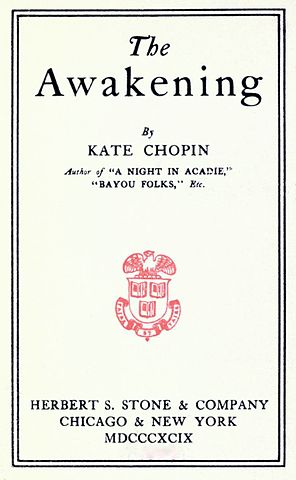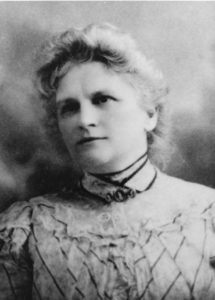” . . . you have to laugh at the things that hurt you just to keep yourself in balance, just to keep the world from running you plumb crazy.”
—from One Flew Over the Cuckoo’s Nest by Ken Kesey
words to inspire before you expire
” . . . you have to laugh at the things that hurt you just to keep yourself in balance, just to keep the world from running you plumb crazy.”
—from One Flew Over the Cuckoo’s Nest by Ken Kesey
Welcome back class.
My impression is that most people don’t know what The Awakening by Kate Chopin is—I definitely didn’t when I read it for the first time for a college class. It’s a novella, 39 short chapters, focusing on a woman’s deterioration and transformation (a lot like The Bell Jar and Anna Karenina—probably why it didn’t make the list, since it made less of an impact than two other well-known and similar novels).
But The Awakening sets itself apart—what looks like the deterioration of a character may actually be a kind of empowerment. Where Anna Karenina depicts a woman who succumbs to her own loneliness, and The Bell Jar features a woman who attempting to conquer depression, The Awakening focuses on a woman who, above all, breaks free. To the other characters in her life, it looks like hysteria or psychosis. But there may be something more to her predicament.
 Protagonist Edna Pontellier is a caged woman—a mother and wife living at the turn-of-the-century in New Orleans. Her cage is her husband, her children, even her own mind’s tiredness . . . she is asleep, in more ways than one. A series of small emotional prods begin to “wake her up” and clue her in to the nature of her life, which she realizes she doesn’t want. Her happiness has been set aside for the sake of who she is supposed to be, but it’s never a life she wanted.
Protagonist Edna Pontellier is a caged woman—a mother and wife living at the turn-of-the-century in New Orleans. Her cage is her husband, her children, even her own mind’s tiredness . . . she is asleep, in more ways than one. A series of small emotional prods begin to “wake her up” and clue her in to the nature of her life, which she realizes she doesn’t want. Her happiness has been set aside for the sake of who she is supposed to be, but it’s never a life she wanted.
A woman in Edna’s life named Adèle helps her realize her caged-ness, which upends life for Mr. Pontellier and their children. She begins to abandon them and all other “obligations.” But she isn’t searching for her own happiness anymore—that’s too cheap a thing to sacrifice a family for, even one she doesn’t want. Edna abandons the things that she’s supposed to be tethered to by Nature’s command. Societal restraints, emotional attachments, marital vows, human instinct . . . she eventually abandons all of these attachments, even her body’s attachment to life. For Edna, this is what it means to be awake: to break free of the cage Nature has put us in.
There’s no doubt that The Awakening is controversial. It seems to champion suicidal behavior in a way that even The Bell Jar couldn’t boast of. Edna’s decision to abandon her children is sorrowful at best, deplorable at worst. Even seeing Edna’s actions as a kind of awakening is controversial—her choices easily indicate a disturbed mind.

Author Kate Chopin
Chopin keeps it complicated. If we as readers are to really believe Edna’s motivations as a true awakening of self, we have to attribute some sense to her actions. But I wouldn’t say Chopin’s goal is to get us to sympathize with Edna’s frame of mind—I think that Chopin’s goal in writing The Awakening was to make us question our motives as human beings, and to question the characteristics humanity lends itself to, like parenthood, desire, loyalty, and even love. What if love is some kind of evolutionary imperative that keeps the species alive? Are we trapped in a cage, like Edna, because of our “obligation” to emotions like love, or concepts like humanity?
To make people ask questions like that is enough reason to put The Awakening on the list of 50 books to read before you die—as it should have been.
I’m still finishing up The Diary of Anne Frank. It’s a complete leap from The Awakening—I’m getting a little whiplash thinking about both at once. Chopin’s fictional story lets me question the flaws in human nature, but Anne Frank’s story will restore my faith in it, even with the stakes she faced.
I look forward to sharing my thoughts on her story next time.
Prof. Jeffrey
“Adversity is like a strong wind. I don’t mean just that it holds us back from places we might otherwise go. It also tears away from us all but the things that cannot be torn, so that afterward we see ourselves as we really are, and not merely as we might like to be.
. . .
Because I’d lived through adversity once before, what I learned about myself was like a reminder of something I’d once known but had nearly forgotten—namely, that beneath the elegant clothing, and the accomplished dancing, and the clever conversation, my life had no complexity at all, but was as simple as a stone falling toward the ground.”
—from Memoirs of a Geisha by Arthur Golden
© 2025 50 Books to Read Before You Die
Theme by Anders Noren — Up ↑
Recent Comments